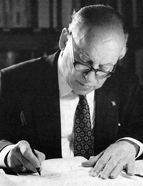

When his aspiration to a professorship was frustrated, he accepted the invitation of Azeredo Perdigão, President of the Calouste Gulbenkian Foundation, to direct the Portuguese Cultural Centre in Paris, an institution he had created with the aim of promoting Portuguese culture in France. Joaquim Veríssimo Serrão was its first director, a position he held until 1972. It was a new return to France, now to develop an activity as if it were a “cultural embassy”, “which sought to convey an image of Portuguese intellectual life” (Andreia da Silva Almeida, p. 375). During his five years in office, he brought a fruitful dynamism to the Centre by promoting conferences, colloquiums, concerts, book and art exhibitions, alongside an editorial programme that resulted in the publication of 60 books and catalogues. Among the publications, the creation of the Calouste Gulbenkian Cultural Centre Archives in 1969 was particularly significant. In the first volume, he presented its objectives as being “a doctrinal and informative body that aims to elevate the values of Portuguese culture”. The collaboration was open to teachers, researchers, French and Portuguese scholars and Lusophiles from all over the world. It responded to the aspirations of a large number of enthusiasts of Portuguese culture and was an ideal tool for analysing the cultural issues of its time. It was the height of the “Marcelist spring”, when the country was beginning to open up to international capitalism. The Centre’s scope was broadened by the support its director provided to Portuguese scholarship holders and political exiles in Paris who were seeking specialisation in their scientific fields.
Once the mission was over and he returned to Portugal, several colleagues from the Faculdade de Letras [School of Arts and Humanities]insisted that he return to the teaching staff. The postponed lecture for full professor was then given on 6 April 19 , obtaining unanimous approval. He was awarded the chair of History of Portuguese Discoveries, which he combined with the regency of History of Portuguese Culture and his appointment as Director of the Infante D. Henrique Historical Institute, where he founded, in collaboration with Jorge Borges de Macedo, the Revista Portugaliae Historica. He devoted himself “heart and soul” to the ideals that had always formed the basis of his understanding as a teacher, historian, researcher and also as an educator. His awareness of his teaching was so strong that he included it in the pages of his “intellectual testament”: “research, as a support for teaching, has always been one of the passions of my life. Both form a whole for any teacher who is conscious of their mission”; “I did not wish to be a mere transmitter of knowledge. In order to be profound, teaching must be based on the constant research to which teachers subject their areas of teaching” (Meio século... p. 20). He continued to publish fundamental works in line with his interest in the theory and methodology of history, which resulted in a survey of authors and works: História Breve da Historiografia Portuguesa (1962) and Historiografia Portuguesa... 3 vols, (1972-1974), leaving unpublished a fourth volume devoted to Historiography in the 19th century. In a related field, chroniclers such as Fernão Lopes, Rui de Pina, Garcia de Resende, António de Castilho and Damião de Góis deserved special attention.
This work is financed by national funds through FCT - Foundation for Science and Technology, I.P, in the scope of the projects UIDB/04311/2020 and UIDP/04311/2020.
